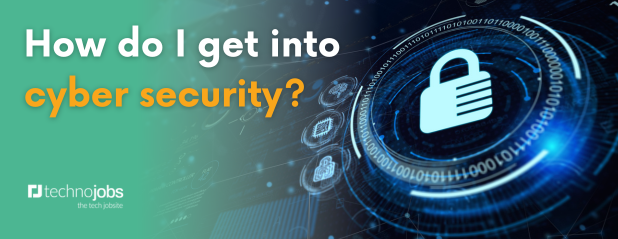How do I get into cyber security?

Due to the advances in technology and the amount of data being produced, cyber-crime is at an all-time high, with the UK having the highest density of cyber crime victims per million internet users, at 4783. Therefore cyber security jobs have increased by 11% in the past year, and with an average salary of £62,000 per year, it’s a promising industry to get into.
Both the public and private sectors have lots of opportunities for cyber professionals, and they are also in great demand which indicates high pay and job security. There are no signs of slowing down for employment of cyber security professionals, as the world begins to rely more on technology. With the growth of smartphones over the past ten years as well as the development of IoT (Internet of Things) gadgets like smart TVs, appliances, and more, all of which fall victim to cyber attacks.
If you want to enter the industry, we’ve put together some of the skills, qualifications, and benefits of becoming a cyber security professional.
What skills do I need for cyber security?
Hard skills in cyber security
- Risk assessment and management
- Authentication
- Linux
- Information systems
- Digital forensics
- Coding languages
- Penetration testing
- Cloud security
Soft skills in cyber security
- Teamwork
- Problem-solving skills
- Communication skills
- Attention to detail
- Self-motivation
What qualifications do I need for cyber security?
If you have recently graduated from university with a degree in computer science, computer programming, or a similar field, you might have had the option to study cyber security as a module. You would have learned the relevant skills employers look for in a graduate. There are normally two main paths for graduates entering cyber security, either in a junior position to gain practical experience or pursuing further education to advance your technical skills.
Further education would include a master’s degree in cyber security, which can also be an option for those looking for a career change. A masters degree would give you a better understanding of the cyber security scene and would provide you with a deeper understanding of a variety of topics, making it easier for you to choose your area of specialisation.
Cyber Security Certifications
A degree in computer science or cyber security is not essential, and what can be valued more is gaining certifications. Many certifications are essential for job advancement and staying current with emerging technology, particularly in the IT and cyber security sectors.
Certifications are excellent for career advancement that go beyond simply developing technical abilities. They help you better understand what you already know and further develop essential skills including communication skills, which are essential if you're thinking of switching from a technical to a managerial position.
There are a number of certifications you can acquire including:
CompTIA Security+
This certification covers application, data, and host security as well as network security, compliance and operation security, threats, and vulnerabilities. After completing this you will be able to demonstrate that you are equipped to protect networks from hackers.
Certified Network Defender (CND)
In this certification, you will learn the fundamentals of network security, defence, analysis, and vulnerability scanning. These topics will help you in creating more effective incident response plans and network security policies.
(ISC)2 CCSP
This is a Certified Cloud Security Professional Certification, where you will learn about cloud system architecture design, secure cloud computing, managing, and securing cloud infrastructure, and much more.
Certified Ethical Hacker (CEH)
This certification is recognised globally and covers attack technologies that are frequently used by hackers. You will learn exactly how to respond to these attacks and be able to demonstrate that you know how to check for weaknesses and vulnerabilities in target systems.
Certified Information Security Manager (CISM)
This certification is designed for security managers, as it’s an expert-level certification that proves skills in risk management and enterprise security systems.
Certified Information Systems Security Professional (CISSP)
This certification is for cyber security professionals looking to progress their careers. It allows you to demonstrate your strong technical and managerial skills. You'll demonstrate your proficiency in the planning, development, execution, and administration of a comprehensive information security programme to defend organisations against increasingly complex assaults.
Is cyber security a good career choice?
A career in cyber security has many benefits as the roles are in high demand, therefore employers want to ensure they are hiring the best talent. Some benefits include:
Flexibility
The majority of responsibilities of a cyber security professional are online, therefore many employers advertise roles as being flexible and remote.
Various career paths
Cyber security has many different career paths and there are several opportunities to help you break into the sector. Whether you're a recent graduate, searching for a career move, or simply trying to take the next step up in the profession you can choose from apprenticeships and master's degrees and a multitude of certifications.
Attractive salary
Because of the high demand for cyber security experts, earnings in the sector are very generous. For example, the average starting salary for Cyber Security Engineer is £35,000. After a few years, you can expect to earn up to £58,000, then surpass £90,000 when you reach the top of your Cyber Security Engineer role.
Find out about the top 10 highest-paying cyber security jobs in 2023 here.
Opportunity to progress
After gaining 2-5 years of experience in lower-level cyber security roles, you can expect to move into a mid-level role such as a Cyber Security Engineer. As you develop your communication and leadership skills you will be able to grow further in your career and with the right certifications you could open yourself to opportunities to work as a Chief Information Security Officer, these sorts of roles need 7-10 years of experience.
Continued learning
Cyber security offers great opportunities for continuous learning due to its ever-expanding potential, both in terms of professional options and educational opportunities. A good cybersecurity specialist will try to learn as much as they can about how businesses and technologies operate.
What cyber security jobs are there?
- Cyber Security Consultant
- Cyber Security Engineer
- Cyber Security Analyst
- Cyber Security Manager
- Cyber Security Architect
- Cyber Security Specialist
As you can see cyber security is a promising industry to get into and whether you’re an undergraduate looking for a degree or simply looking for a career change, there are many different career paths to consider before entering this lucrative industry.




